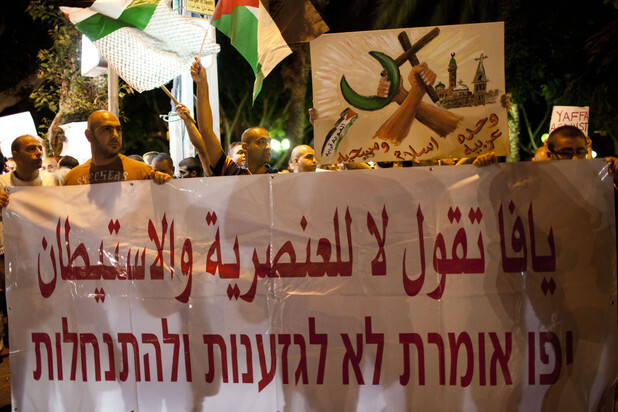4 March 2014

Palestinians are resisting the latest Israeli attempt to fragment them along sectarian lines.
ActiveStillsPalestinian civil society groups in present-day Israel have rejected a discriminatory bill passed into law by Israel’s parliament, the Knesset, on 24 February, which defines Palestinian Christian citizens of Israel as “non-Arab.”
Although there were objections, the bill passed by a 21-6 vote.
“It’s a historic and important step that could balance the State of Israel and connect us to the Christians, and I am careful not to refer to them as Arabs, because they are not Arabs,” rightwing Israeli politician Yariv Levin, a sponsor of the bill, said in January, as reported by Ali Abunimah at the time.
A group of 18 Palestinian NGOs in present-day Israel subsequently released a joint statement that denounced the law as “sectarian” and “similar to the approaches adopted by the apartheid regime in South Africa, and by the French in its colonial rule in Algeria, among others. It is a policy that seeks to fragment the original people of the land into small groups with narrowed identities to replace their national identity.”
Hierarchy
The law is only the latest of several policies aimed at preserving a religious and ethnic hierarchy that privileges Jewish Israelis over their compatriots. Palestinians in Israel face dozens of discriminatory laws that limit their freedom of political expression and access to education, land, housing, education and state resources, according to Adalah, a Haifa-based legal rights group and a signatory of the joint statement.
Since its establishment in 1948, Israel has sought to sow division among Palestinians in both present-day Israel and in the occupied Palestinian territory.
Among Palestinian citizens of Israel, members of the Druze religious community are required to serve in Israel’s occupation army, though a growing number of Druze youth are choosing jail time over military service.
Christian Palestinians have also been targeted for military service in recent years, which includes crude plans to stir up religious sectarianism in Palestinian cities and towns with diverse religious communities, such as Nazareth.
The joint statement also added:
We vehemently reject all attempts by the Israeli government to fragment and segregate the Arab Palestinian society along sectarian lines of Christians and Muslims. We assert that we were and will continue to be one people united – albeit with different religions and ideological affiliations – and an integral part of the Arab Palestinian people.
“Historical rights”
It went on to reaffirm that the Palestinian minority inside Israel “has historical rights to and in this land.”
The unity of Palestinian citizens against Israel’s divide-and-conquer policies was most recently demonstrated during the highly organized campaign against the Prawer Plan. The now-halted legislation aimed to uproot tens of thousands of Palestinian Bedouin residents of the Naqab (Negev) region of the country in order to make way for Jewish-only settlements and military areas.
The statement is reproduced in its entirety below:
We, the Palestinian civil society organizations in Israel, absolutely reject the new law enacted by the Knesset on 24 February 2014, which replaces Arab representation on a public advisory board of the Equal Employment Opportunity Commission with sectarian representation. This new law is a dangerous attempt by the state to distort the Arab identity of Palestinians in Israel. Despite its actual marginal impact, racist motives underlie this law and foreshadow the enactment of more racist bills and policies, which we will oppose.
We vehemently reject all attempts by the Israeli government to fragment and segregate the Arab Palestinian society along sectarian lines of Christians and Muslims. We assert that we were and will continue to be one people united – albeit with different religions and ideological affiliations – and an integral part of the Arab Palestinian people. We have the right to define our national identity, which is based on our Arab culture, language, common history, and on the unity of our destiny and our future as a single original group that remains in its homeland.
The political, colonial motives behind this law are similar to the approaches adopted by the apartheid regime in South Africa, and by the French in its colonial rule in Algeria, among others. It is a policy that seeks to fragment the original people of the land into small groups with narrowed identities to replace their national identity.
We view the Israeli government’s efforts to break up the collective national character of the Arab Palestinian minority as an integral part of its initiative to gain recognition of the state as a Jewish state, and to deny the existence of the Arab Palestinian minority as a national group with historical rights to and in this land. Therefore, we assert that we fully hold on to our historical rights, including our right to defining our identity in our homeland.
Organizations’ signatories: Adalah, Mossawa, Sidreh, the Regional Council for the Unrecognized Villages in the Naqab, the Follow-up Committee for Arab Education, Al Mezan Center for Human Rights – Nazareth, Baladna – Association for Arab Youth, I’lam Center, Aswat – Palestinian Lesbian Feminists, Social Development Committee – Haifa, The Arab Association for Human Rights, Kayan – Feminist Organization, Women Against Violence, Al Zahra Organization for the Advancement of Women’s Status, Al-Qaws for Sexual & Gender Diversity in the Palestinian Society, Nisa’ wa Afaq, Association for the Defense of the Rights of the Internally Displaced, Assiwar - Arab Feminist Movement.






Comments
sectarian
Permalink John replied on
zionist attempts of dividing the Palestinians on sectarian lines goes back to the 1920's
http://links.org.au/node/206
The origins of the Palestinian resistance
Betrayed by the British, the Palestinians railed against both the British mandate and Zionist settlement. In particular, the Palestinians opposed any British attempts to divide their community along religious grounds, demanding to be treated as a single community. The Palestinians felt that by trying to divide them on religious grounds, Britain was trying to undermine the united Palestinian position that opposed increased Zionist colonisation.
and
John B Judis new book Genesis: Truman, American Jews, and the Origins of the Arab/Israeli Conflict, writes about
in the 1920s the British and the zionists in Palestine sought to defuse angry Palestinian opposition to Jewish nationalism by promoting Palestinian Muslim groups. They believe that they could destroy Arab nationalism by dividing Muslims and Christians to create a religious conflict.